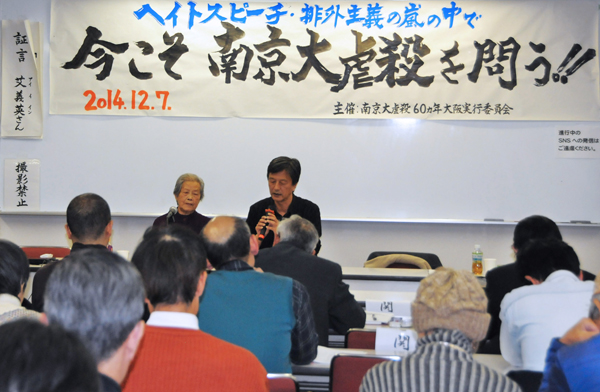Home> News
Nanjing Massacre survivor attends testimony meeting in Japan
(Xinhua)
2014-12-08
 |
|
Ai Yiying, one of the around 200 living survivors of the Nanjing Massacre in 1937, shares her memory of the incident with Japanese residents at a testimony meeting in Osaka, Japan, Dec 7, 2007. [Photo/Xinhua] |
OSAKA - Ai Yiying, one of the around 200 living survivors of the Nanjing Massacre in 1937, shared her memory of the incident with Japanese residents at a testimony meeting Sunday in Osaka, conveying the truth about Nanjing Massacre.
The 86-years-old woman was still a little girl when the Nanjing city was invaded by Japanese army in December 1937. "I was only nine years old. One day, the Japanese soldiers came to my village, raped and killed people and burned houses." Ai recalled.
Ai's father, uncles and cousins were taken away from their home by the Japanese soldiers. Six of them were killed, and one severely injured. The rest of the family had to hide in the woods to avoid the raping and killing.
"The atrocities continued in the following months. There were dead bodies everywhere. I was afraid of dead bodies. But my mother told me what was frightening was not the dead bodies, but the Japanese soldiers, who killed them," Ai said.
"My family was not the only victims. As many as 300,000 Chinese people were killed in Nanjing Massacre in 1937. What the Japanese soldiers did in China were horrible," Ai said.
Ai was invited by the Chinese War Victims Testimony Meeting Committee in Japan to share her story. More than 100 Japanese residents attended the testimony meeting. When Ai finished telling her experience, all attendants of the meeting stood up and mourned in silence for the victims of Nanjing Massacre.
The testimony meeting has been an annual tradition since 1994. So far, a total of 51 survivors have attended the testimony meetings in 36 different groups, sharing their experiences with Japanese residents about the atrocities the Japanese army committed during its invasion of China.
"It's been 77 years. We shall always remember this history, and by doing that, value peace and warn people never to let such tragedy happen again." Ai said.






